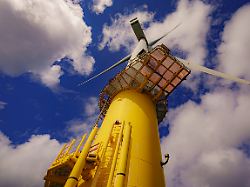Costs make developers hesitant
No interest in new offshore facilities off the British coast
September 8, 2023, 3:49 p.m
Listen to article
This audio version was artificially generated. More info | Send feedback
Despite state subsidies, no company is currently daring to build new wind turbines off the coast of Great Britain. The costs are too high in view of the increased inflation and ongoing supply chain problems. London is still sticking to its expansion goals.
In view of increased costs, no interested parties were found for new offshore wind farms at the annual auction for the state-funded expansion of renewable energies in Great Britain. Accordingly, no new contracts could be awarded for the development of anchored or floating offshore wind turbines, as can be seen from the results of the award round. Offshore wind power remains central to Britain’s goal of switching to “green” electricity production, emphasized the Conservative Minister of State for Energy Security and Climate, Graham Stuart. Because of high inflation and supply chain problems, project developers have held back. The opposition spoke of an energy policy disaster.
“The Conservatives have now trashed the industries that were supposed to be the crown jewels of Britain’s energy system,” said Labor shadow minister Ed Miliband. The government is blocking cheap and clean domestic energy that Great Britain needs.
The government in London launched a campaign in 2014 in which renewable energy project developers received a guaranteed price for the electricity produced by the systems. However, this was reduced this year compared to the 2022 auction. At the same time, the government has increased the subsidy pot for this year’s award by £22 million to £227 million. But apparently this has not convinced potential offshore wind investors.
Costs are around 40 percent higher
Project developers – and climate protectors – had already warned before the award round that investors would not be able to cover their costs without higher subsidies. According to energy suppliers RWE from Germany and Vattenfall from Sweden, the costs of offshore wind projects have increased by around 40 percent. RWE country boss Tom Glover said that without decisive action by the government, it is questionable whether Great Britain will be able to expand the capacity of offshore wind turbines as planned. Great Britain wants to achieve capacities of 50, up from 14 gigawatts, by 2030.
Vattenfall had recently taken a break from developing a project that it was awarded in last year’s British auction round. When the award was made in 2022, most of the funding capacities went to developers of offshore wind farms. This year, solar energy projects top the list, followed by onshore wind turbines. However, the lull in the auction of offshore wind power licenses will leave a clear mark in 2023: Overall, the capacity of renewable energy projects fell from 11 gigawatts last year to 3.7 gigawatts now.
